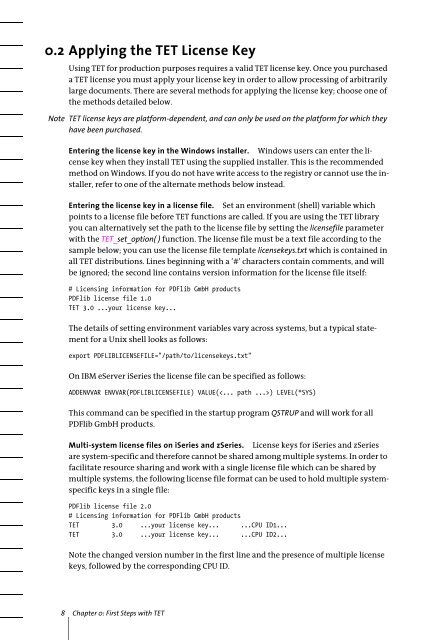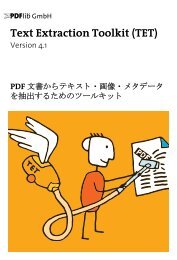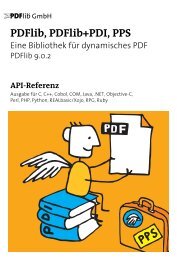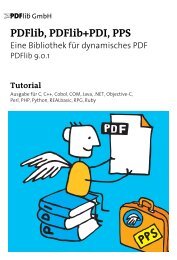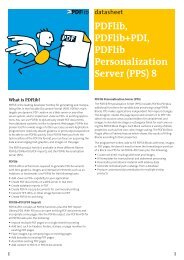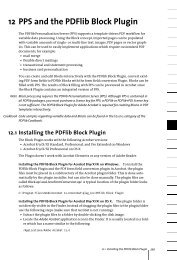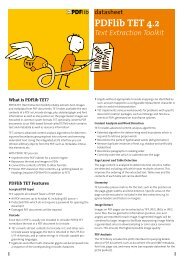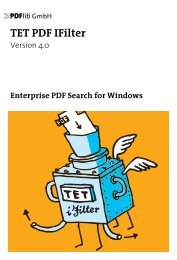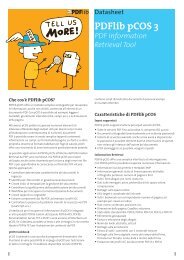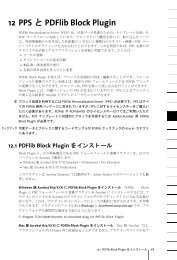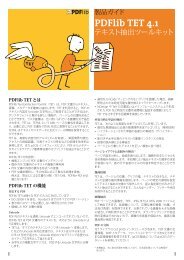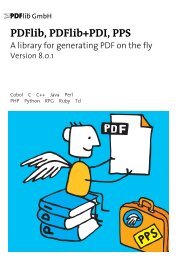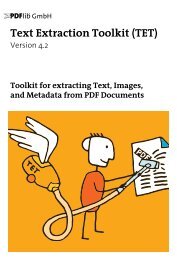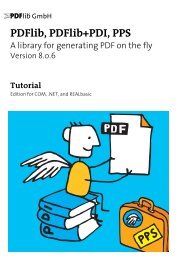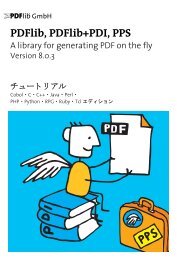PDFlib Text Extraction Toolkit (TET) Manual
PDFlib Text Extraction Toolkit (TET) Manual
PDFlib Text Extraction Toolkit (TET) Manual
Create successful ePaper yourself
Turn your PDF publications into a flip-book with our unique Google optimized e-Paper software.
0.2 Applying the <strong>TET</strong> License Key<br />
Using <strong>TET</strong> for production purposes requires a valid <strong>TET</strong> license key. Once you purchased<br />
a <strong>TET</strong> license you must apply your license key in order to allow processing of arbitrarily<br />
large documents. There are several methods for applying the license key; choose one of<br />
the methods detailed below.<br />
Note <strong>TET</strong> license keys are platform-dependent, and can only be used on the platform for which they<br />
have been purchased.<br />
Entering the license key in the Windows installer. Windows users can enter the license<br />
key when they install <strong>TET</strong> using the supplied installer. This is the recommended<br />
method on Windows. If you do not have write access to the registry or cannot use the installer,<br />
refer to one of the alternate methods below instead.<br />
Entering the license key in a license file. Set an environment (shell) variable which<br />
points to a license file before <strong>TET</strong> functions are called. If you are using the <strong>TET</strong> library<br />
you can alternatively set the path to the license file by setting the licensefile parameter<br />
with the <strong>TET</strong>_set_option( ) function. The license file must be a text file according to the<br />
sample below; you can use the license file template licensekeys.txt which is contained in<br />
all <strong>TET</strong> distributions. Lines beginning with a ’#’ characters contain comments, and will<br />
be ignored; the second line contains version information for the license file itself:<br />
# Licensing information for <strong>PDFlib</strong> GmbH products<br />
<strong>PDFlib</strong> license file 1.0<br />
<strong>TET</strong> 3.0 ...your license key...<br />
The details of setting environment variables vary across systems, but a typical statement<br />
for a Unix shell looks as follows:<br />
export PDFLIBLICENSEFILE="/path/to/licensekeys.txt"<br />
On IBM eServer iSeries the license file can be specified as follows:<br />
ADDENVVAR ENVVAR(PDFLIBLICENSEFILE) VALUE() LEVEL(*SYS)<br />
This command can be specified in the startup program QSTRUP and will work for all<br />
<strong>PDFlib</strong> GmbH products.<br />
Multi-system license files on iSeries and zSeries. License keys for iSeries and zSeries<br />
are system-specific and therefore cannot be shared among multiple systems. In order to<br />
facilitate resource sharing and work with a single license file which can be shared by<br />
multiple systems, the following license file format can be used to hold multiple systemspecific<br />
keys in a single file:<br />
<strong>PDFlib</strong> license file 2.0<br />
# Licensing information for <strong>PDFlib</strong> GmbH products<br />
<strong>TET</strong> 3.0 ...your license key... ...CPU ID1...<br />
<strong>TET</strong> 3.0 ...your license key... ...CPU ID2...<br />
Note the changed version number in the first line and the presence of multiple license<br />
keys, followed by the corresponding CPU ID.<br />
8 Chapter 0: First Steps with <strong>TET</strong>


